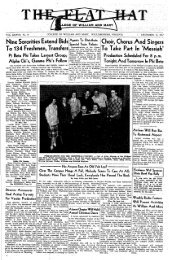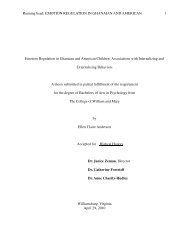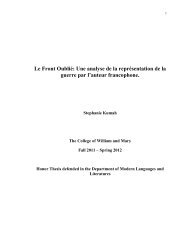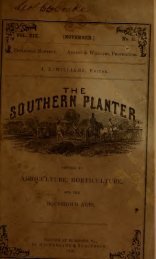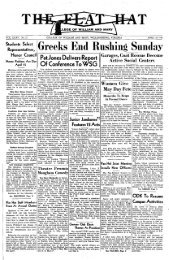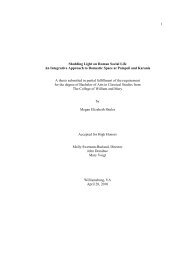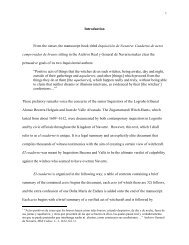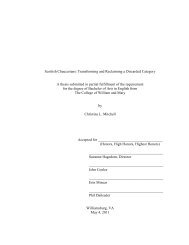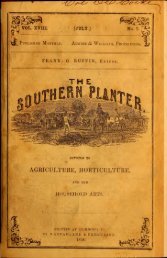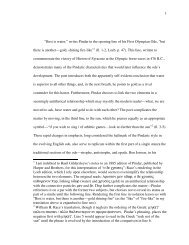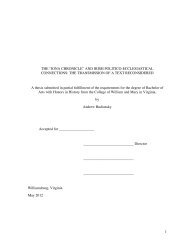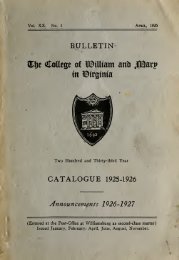Southern planter - The W&M Digital Archive
Southern planter - The W&M Digital Archive
Southern planter - The W&M Digital Archive
You also want an ePaper? Increase the reach of your titles
YUMPU automatically turns print PDFs into web optimized ePapers that Google loves.
1859.] THE SOUTHERN PLANTER 437<br />
From the.British Farmer's Magazine.<br />
<strong>The</strong> Principles that should Guide the<br />
Farmer in Breeding Stock, with more<br />
especial reference to Houses.<br />
A quarterly meeting of the members of<br />
the Wen lock Farmers' Club was recently<br />
held, at the Raven Hotel, Much Wenlock,<br />
to hear Mr. Griffith Evans, of Bridgnorth,<br />
deliver a lecture upon " <strong>The</strong> principles that<br />
should guide the farmers in breeding stock,<br />
with more especial reference to horses."<br />
In the absence of the President, the Rev.<br />
H. R. Smythies was called to the chair.<br />
<strong>The</strong> lecturer began by contrasting the<br />
present Shropshire-down sheep with their<br />
ancestors thirty years ago, and he showed<br />
how that the great improvement had been<br />
made by breeding upon some scientific principles.<br />
Yet he was persuaded that many<br />
follow the new system who are not acquainted<br />
with the principles. <strong>The</strong>y do it because<br />
it is the fashion, and answers the purpose<br />
better—not knowing the why and the<br />
wherefore it should answer better. He<br />
should therefore draw their attention to Na-<br />
ture's laws of breeding. <strong>The</strong> same law is<br />
applicable to all animals, only, of course,<br />
requiring certain modifications which their<br />
good sense might easily direct. It is a lamentable<br />
fact that horse-breeding is very<br />
much neglected throughout the country,<br />
especially hunters and carriage horses; nor<br />
has the draught horse had the attention he<br />
deserves. He (Mr. Evans) should, therefore,<br />
more especially point out how to apply<br />
the principles of breeding to horses than to<br />
other animals. Mr. Robert Smith, in his<br />
excellent "Report on the Exhibition of<br />
Live Stock at Chester," published in the<br />
last volume of the Royal Agricultural Society's<br />
Journal, says that " <strong>The</strong> breeding of<br />
the horse is a national subject, but as yet<br />
has not been treated as such. <strong>The</strong>re is a<br />
want of system in our arrangement and<br />
management." He quite agreed with Mr.<br />
Smith. Our fairs are overstocked with<br />
horses, but so shapeless that it is difficult to<br />
say for what purpose most of them are<br />
adapted. He thought he might safely say<br />
that the average value of four-fifths of our<br />
four-year-old horses, of all sorts that we see<br />
in the fairs, is hardly £20 to £25, and it is<br />
difficult to sell many of them at any price.<br />
Now, taking into consideration their cost of<br />
breeding and rearing, with all risks and so<br />
on, no wonder, then, breeders say they do<br />
not pay. <strong>The</strong> average value of the remaining<br />
one-fifth it is difficult to say ; but<br />
they sell readily for from £40 up to almost<br />
any amount you can reasonably conceive.<br />
Now, I ask those breeders who complain,<br />
why do they breed horses at all ? " Oh,"<br />
they say, " to consume the grass properly<br />
we must have cattle, sheep, and horses, too,<br />
—they all differ in their bite so." Very<br />
well, then, if you breed horses of some<br />
sort, why don't you breed good ones ? Does<br />
an ill-shaped horse consume less food than a<br />
good one ? Is it cheaper to breed poor<br />
than good horses ? My motto is this always<br />
: " If it is worth my while to do a<br />
thing at all, it is worth my while to do it as<br />
well as I possibly can ;" and I have no hesitation<br />
at all in saying that it would pay<br />
you as well as anything to breed real good<br />
horses. Some of you may perhaps say, as<br />
I have heard others say, that in breeding<br />
cattle and sheep you are seldom disappointed;<br />
the progeny is always what you expected<br />
; while in breeding horses you have<br />
no idea what the colour or shape of the<br />
colt will be until you see it, it is quite a<br />
lottery. It may be this : it may be that.<br />
You hope the best, and the worst will disappoint<br />
you; for you do not believe in<br />
horse-flesh. Thank you, my dear friend,<br />
that is a candid confession at any rate,<br />
which goes so far as to prove that you have<br />
never practised horse-breeding upon right<br />
principles. Before I came here I lived in<br />
Lincolnshire. <strong>The</strong>re, good horses are com-<br />
paratively plentiful ; much better than those<br />
bred in Shropshire, taking all together.<br />
You excel in sheep ; I wish you to excel in<br />
horses, too ; I wish to see dealers flocking<br />
from all parts of the world to Shropshire<br />
for horses. I wish to see the tide turned<br />
from Lincoln and Horncastle fairs to<br />
Shrewsberry and Bridgnorth; or, at any<br />
rate, to see the trade as strong here as<br />
there. It is not impossible ; the country<br />
is naturally well adapted for breeding purposes;<br />
you only want the system. Don't<br />
despair, a patient perseverance will overcome<br />
all difficulties. Let us all, then, this<br />
evening, enter into the subject in good<br />
earnest, determined to sift the matter tho-<br />
roughly, and to profit by the investigation.<br />
He went on to notice that the first great<br />
law of nature in breeding is, that like<br />
should produce like ; if it was not for this<br />
law, which is constant and without exception,<br />
a mare might produce a calf, a sow



